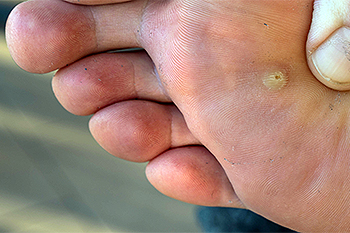
The human papilloma virus (HPV) is responsible for the development of plantar warts. It is considered to be a contagious virus, and can be transmitted between people in public swimming areas and locker rooms. It is suggested to wear appropriate shoes while in these types of environments. Plantar warts are defined as small, hardened areas of skin that form on the bottom of the feet. They grow inward as a result of the constant pressure the foot endures from walking and standing. This type of wart can cause severe pain while walking, and it may be difficult to complete daily activities. These warts may have tiny black dots in the center, which are blood vessels. Research has shown that plantar warts are more common among children than adults as a result of the immunity that adults develop towards the virus over the years. If the wart is too bothersome to ignore, it is strongly suggested that you schedule an appointment with a podiatrist who can recommend correct treatment options for you.
Plantar warts can be very uncomfortable. If you need your feet checked, contact Dr. Scott Peters from Ankle & Foot Walk-In Clinic. Our doctor will assist you with all of your foot and ankle needs.
About Plantar Warts
Plantar warts are the result of HPV, or human papillomavirus, getting into open wounds on the feet. They are mostly found on the heels or balls of the feet.
While plantar warts are generally harmless, those experiencing excessive pain or those suffering from diabetes or a compromised immune system require immediate medical care. Plantar warts are easily diagnosed, usually through scraping off a bit of rough skin or by getting a biopsy.
Symptoms
- Lesions on the bottom of your feet, usually rough and grainy
- Hard or thick callused spots
- Wart seeds, which are small clotted blood vessels that look like little black spots
- Pain, discomfort, or tenderness of your feet when walking or standing
Treatment
- Freezing
- Electric tool removal
- Laser Treatment
- Topical Creams (prescription only)
- Over-the-counter medications
To help prevent developing plantar warts, avoid walking barefoot over abrasive surfaces that can cause cuts or wounds for HPV to get into. Avoiding direct contact with other warts, as well as not picking or rubbing existing warts, can help prevent the further spread of plantar warts. However, if you think you have developed plantar warts, speak to your podiatrist. He or she can diagnose the warts on your feet and recommend the appropriate treatment options.
If you have any questions please feel free to contact our office located in Mayfield Village, OH . We offer the newest diagnostic and treatment technologies for all your foot and ankle needs.
